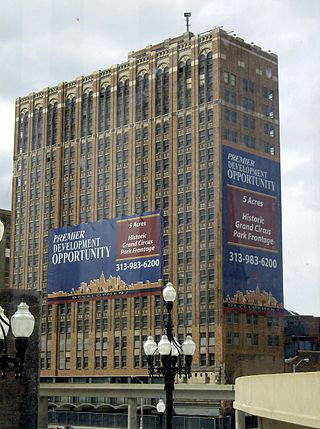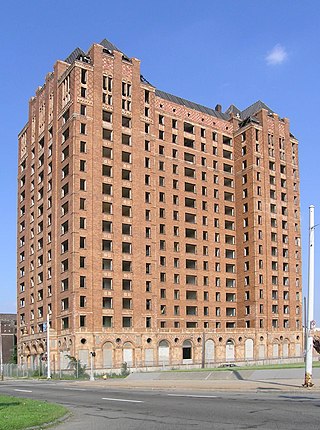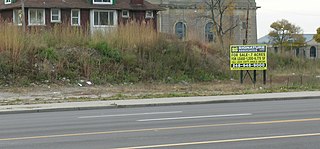
The Fox Theatre is a performing arts center located at 2211 Woodward Avenue in Downtown Detroit, Michigan, near the Grand Circus Park Historic District. Opened in 1928 as a flagship movie palace in the Fox Theatres chain, it was at over 5,000 seats the largest theater in the city. Designed by theater architect C. Howard Crane, it was listed on the National Register of Historic Places in 1985.

Ilitch Holdings, Inc. is an American holding company established in 1999 to provide all companies owned by Mike and Marian Ilitch with professional and technical services. Its privately held businesses include Little Caesars Pizza, the National Hockey League (NHL) Detroit Red Wings, the Major League Baseball (MLB) Detroit Tigers, Olympia Entertainment, Olympia Development, Olympia Parking, Blue Line Foodservice Distribution, Champion Foods, 313 Presents, the Little Caesars Pizza Kit Fundraising Program, Hockeytown Cafe, and a variety of venues within these entities. Ilitch Holdings subsidiaries manage Detroit's Fox Theatre, City Theatre, Comerica Park, Pine Knob Music Theatre, Michigan Lottery Amphitheater, Meadow Brook Amphitheater, and Little Caesars Arena, which replaced Joe Louis Arena after closing in July 2017.

The Cadillac Tower is a 40-story, 133.4 m (438 ft) Neo-Gothic skyscraper designed by the architectural firm of Bonnah & Chaffee at 65 Cadillac Square in downtown Detroit, Michigan. The building's materials include terra cotta and brick. It was built in 1927 as Barlum Tower. At the top of the tower is a tall guyed mast for local radio stations WMXD, WLLZ and television station WLPC-CD. It was listed on the National Register of Historic Places in 2005.

Louis Kamper was an American architect, active in and around Detroit and Wayne County, Michigan, in the United States.

The Vinton Building is a residential high-rise located at 600 Woodward Avenue in Downtown Detroit, Michigan. It stands next to the First National Building, across Woodward Avenue from Chase Tower and the Guardian Building, and across Congress Street from One Detroit Center. It was designated a Michigan State Historic Site in 1982 and listed on the National Register of Historic Places in 1983.

The Lafayette Building was a high-rise office building located at 144 West Lafayette Boulevard in downtown Detroit, Michigan. It was built in 1923 and occupied a triangular lot, bordered by Michigan Avenue, West Lafayette Boulevard, and Shelby Street. The building was 14 floors tall, with one basement floor, and 13 above-ground floors. The office building was designed in the neo-classical architecture style by C. Howard Crane who built many of Detroit's theaters. It is built with mainly brick, limestone, and terra cotta. Its triangular form mimicked the Flatiron Building in Manhattan.

The United Artists Theatre Building is a vacant high-rise tower in downtown Detroit, Michigan, standing at 150 Bagley Avenue. It was built in 1928 and stands 18 stories tall. The building was designed by architect C. Howard Crane in the renaissance revival architectural style, and is made mainly of brick. Until December 29, 1971, it was a first-run movie house and office space, and then after that, the theatre saw sporadic usage until 1973. The United Artists Theatre, designed in a Spanish-Gothic design, sat 2,070 people, and after closing served from 1978 to 1983 as the Detroit Symphony Orchestra's recording theater. After the theater closed, the office block struggled as tenants moved to suburbs. It finally closed in 1984. An original 10-story, vertical UA sign was replaced in the 1950s with a marquee that remained until 2005. The building once shared a lot with the now demolished Hotel Tuller.

The Lawyers Building is an office building located at 137 Cadillac Square in downtown Detroit, Michigan. It was also known as the American Title Building. The building was listed on the National Register of Historic Places in 1982.

The Lee Plaza is a vacant 16-story high-rise apartment building located at 2240 West Grand Boulevard, about one mile west of New Center along West Grand Boulevard, an area in Detroit, Michigan. It is a registered historic site by the state of Michigan and was added to the United States National Register of Historic Places on November 5, 1981. Designed by Charles Noble and constructed in 1929, it rises to 16 floors and is an excellent example of Art Deco architecture of the 1920s.

The Belcrest Apartments is an apartment building located at 5440 Cass Avenue in Midtown Detroit, Michigan. It was built in 1926 as the Belcrest Hotel, designated a Michigan State Historic Site in 1983, and listed on the National Register of Historic Places in 1984. It is significant as an early example of the apartment hotel development concept in Detroit, and a major early work of architect Charles N. Agree.

The Park Avenue House is a high rise residential building located at 2305 Park Avenue in the Park Avenue Historic District in Downtown Detroit, Michigan. It was listed on the National Register of Historic Places in 1996. It should not be confused with the nearby Park Avenue Hotel, which was demolished in 2015.

The Park Avenue Building is a 12-story beaux-arts high-rise located at 2001–2017 Park Avenue in the Grand Circus Park Historic District in Downtown Detroit, Michigan. Formerly known as the General Necessities Building, the 101,565 sq. ft. office building was designed by Albert Kahn in 1922.

The Women's City Club is a women's club located at 2110 Park Avenue in Downtown Detroit, Michigan, within the Park Avenue Historic District. It was listed on the National Register of Historic Places and designated a Michigan State Historic Site in 1979.

The Chateau Frontenac Apartments was an apartment building located in Detroit, Michigan. It bore the name of the famous Château Frontenac hotel. The building was listed on the National Register of Historic Places in 1991, but was subsequently demolished in 1999. It was removed from the National Register in 2020.

The Detroit Financial District is a United States historic district in downtown Detroit, Michigan. The district was listed on the U.S. National Register of Historic Places on December 14, 2009, and was announced as the featured listing in the National Park Service's weekly list of December 24, 2009.

The Park Avenue Hotel was a hotel in the Cass Corridor of Detroit, Michigan. It was listed on the National Register of Historic Places in 2006. It was also known as Salvation Army Harbor Light Center and is not to be confused with Park Avenue House, also once known as Park Avenue Hotel. The building was imploded on July 11, 2015.

Little Caesars Arena is a multi-purpose arena in Midtown Detroit. Opened on September 5, 2017, the arena, which cost $862.9 million to construct, replaced Joe Louis Arena and The Palace of Auburn Hills as the home of the Detroit Red Wings of the National Hockey League (NHL) and the Detroit Pistons of the National Basketball Association (NBA), respectively.

The New Center Commercial Historic District is a commercial historic district located on Woodward Avenue between Baltimore Street and Grand Boulevard in Detroit, Michigan. It was listed on the National Register of Historic Places in 2016.

The Gabriel Richard Building, also known as the Weil and Company Building, is high-rise located at 305 Michigan Avenue in Downtown Detroit, Michigan. It was listed on the National Register of Historic Places in 2017. The building will open as a residential apartment building known as the Gabriel Houze in late 2017.
George W. Jackson (born January 1, 1953) is an American real estate developer. From 2002 to 2014, he served as President and CEO of the Detroit Economic Growth Corp (DEGC), a non-profit organization which offers, financial, technical, and development assistance in Michigan.





















